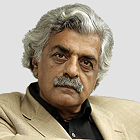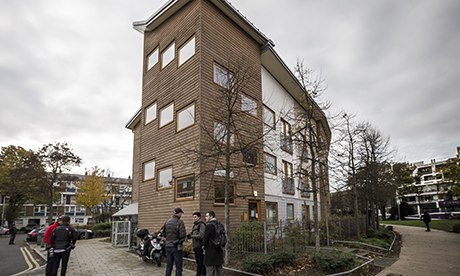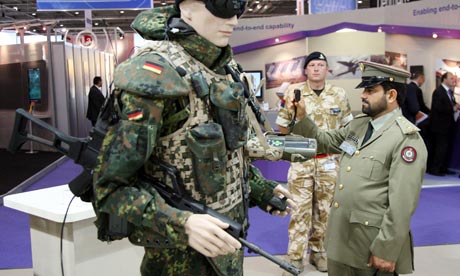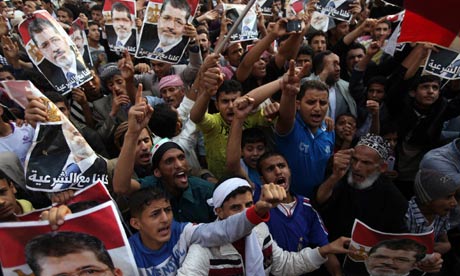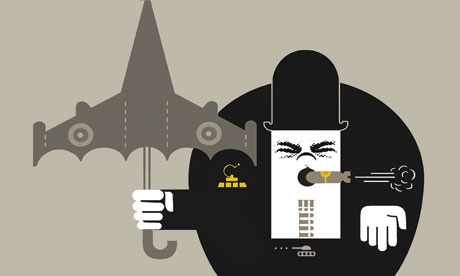Robert Fisk:
When he worked at The Times, Robert Fisk witnessed the curious working practices of the paper's proprietor, Rupert Murdoch. Despite their jocular exchanges, the writer knew he couldn't stay...
Monday, 11 July 2011 in The Independent
He is a caliph, I suppose, almost of the Middle Eastern variety.
You hear all these awful things about Arab dictators and then, when you meet them, they are charm itself. Hafez al-Assad once held my hand in his for a long time with a paternal smile. Surely he can't be that bad, I almost said to myself – this was long before the 1982 Hama massacres. King Hussein would call me "Sir", along with most other journalists. These potentates, in public, would often joke with their ministers. Mistakes could be forgiven.
The "Hitler Diaries" were Murdoch's own mistake, after refusing to countenance his own "expert's" change of heart over the documents hours before The Times and The Sunday Times began printing them. Months later, I was passing by the paper's London office on my way back to Beirut when the foreign editor, Ivan Barnes, held up the Reuters wire copy from Bonn. "Aha!" he thundered. "The diaries are forgeries!" The West German government had proved that they must have been written long after the Führer's death.
So Barnes dispatched me to editor Charles Douglas-Home's office with the Reuters story and I marched in only to find Charlie entertaining Murdoch. "They say they're forgeries, Charlie," I announced, trying not to glance at Murdoch. But I did when he reacted. "Well, there you go," the mogul reflected with a giggle. "Nothing ventured, nothing gained." Much mirth. The man's insouciance was almost catching. Great Story. It only had one problem. It wasn't true.
Oddly, he never appeared the ogre of evil, darkness and poison that he's been made out to be these past few days. Maybe it's because his editors and sub-editors and reporters repeatedly second-guessed what Murdoch would say. Murdoch was owner of The Times when I covered the blood-soaked Israeli invasion and occupation of Lebanon in 1982. Not a line was removed from my reports, however critical they were of Israel. After the invasion, Douglas-Home and Murdoch were invited by the Israelis to take a military helicopter trip into Lebanon. The Israelis tried to rubbish my reporting; Douglas-Home said he stood up for me. On the flight back to London, Douglas-Home and Murdoch sat together. "I knew Rupert was interested in what I was writing," he told me later. "He sort of waited for me to tell him what it was, although he didn't demand it. I didn't show it to him."
But things changed. Before he was editor, Douglas-Home would write for the Arabic-language Al-Majella magazine, often deeply critical of Israel. Now his Times editorials took an optimistic view of the Israeli invasion. He stated that "there is now no worthy Palestinian to whom the world can talk" and – for heaven's sake – that "perhaps at last the Palestinians on the West Bank and in the Gaza Strip will stop hoping that stage-strutters like Mr Arafat can rescue them miraculously from doing business with the Israelis."
All of which, of course, was official Israeli government policy at the time.
Then, in the spring of 1983, another change. I had, with Douglas-Home's full agreement, spent months investigating the death of seven Palestinian and Lebanese prisoners of the Israelis in Sidon. It was obvious, I concluded, that the men had been murdered – the grave-digger even told me that their corpses had been brought to him, hands tied behind their backs, showing marks of bruising. But now Douglas-Home couldn't see how we would be "justified" in running a report "so long after the event".
In other words, the very system of investigative journalism – of fact-checking and months of interviews – became self-defeating. When we got the facts, too much time had passed to print them. I asked the Israelis if they would carry out a military inquiry and, anxious to show how humanitarian they were, they duly told us there would be an official investigation. The Israeli "inquiry" was, I suspected, a fiction. But it was enough to "justify" publishing my long and detailed report. Once the Israelis could look like good guys, Douglas-Home's concerns evaporated.
When he died, of cancer, it was announced that his deputy, Charles Wilson, would edit the paper. Murdoch said that Wilson was "Charlie's choice" and I thought, so, all well and good – until I was chatting to Charlie's widow and she told me that it was the first time she had heard that Wilson's editorship had been her late husband's decision. We all knew Murdoch had signed up to all manner of guarantees of editorial independence, oversight and promises of goodwill when he bought The Times – and had then fired his first editor, Harold Evans. He would deal with the trade unionists later.
Charles Wilson – who much later became, briefly, the editor of The Independent – was a tough, friendly man who could show great kindness, as well as harshness, to his staff. He was kind to me, too. But once, when I was visiting Wilson in London, Murdoch walked into his office. "Hallo, Robert!" Murdoch greeted me, before holding a jocular conversation with Wilson. And, after he had left, Wilson said to me in a hushed voice: "See how he called you by your first name?" This was laughable. It was like the Assad smile or the King Hussein "Sir". It meant nothing. Murdoch was joking with his ministers and courtiers.
A warning sign. Still in west Beirut, where dozens of Westerners were being kidnapped, I opened The Times to discover that a pro-Israeli writer was claiming on our centre page that all journalists in west Beirut, clearly intimidated by "terrorism", could be regarded only as "bloodsuckers". Was the paper claiming that I, too, was a bloodsucker? In all this time, Murdoch had expressed exclusively pro-Israeli views, and had accepted a "Man of the Year" award from a prominent Jewish-American organisation. The Times editorials became more and more pro-Israeli, their use of the word "terrorist" ever more promiscuous.
The end came for me when I flew to Dubai in 1988 after the USS Vincennes had shot down an Iranian passenger airliner over the Gulf. Within 24 hours, I had spoken to the British air traffic controllers at Dubai, discovered that US ships had routinely been threatening British Airways airliners, and that the crew of the Vincennes appeared to have panicked. The foreign desk told me the report was up for the page-one splash. I warned them that American "leaks" that the IranAir pilot was trying to suicide-crash his aircraft on to the Vincennes were rubbish. They agreed.
Next day, my report appeared with all criticism of the Americans deleted, with all my sources ignored. The Times even carried an editorial suggesting the pilot was indeed a suicider. A subsequent US official report and accounts by US naval officers subsequently proved my dispatch correct. Except that Times readers were not allowed to see it. This was when I first made contact with The Independent. I didn't believe in The Times any more – certainly not in Rupert Murdoch.
Months later, a senior night editor who had been on duty on the night my Vincennes report arrived, recalled in a letter that he had promoted my dispatch as the splash, but that Wilson had said: "There's nothing in it. There's not a fact in it. I wouldn't even run this gibberish." Wilson, the night editor said, called it "bollocks" and "waffle". The night editor's diary for that day finished: "Shambles, chaos on Gulf story. [George] Brock [Wilson's foreign editor] rewrites Fisk."
The good news: a few months later, I was Middle East correspondent for The Independent. The bad news: I don't believe Murdoch personally interfered in any of the above events. He didn't need to. He had turned The Times into a tame, pro-Tory, pro-Israeli paper shorn of all editorial independence. If I hadn't been living in the Middle East, of course, it might have taken me longer to grasp all this.
But I worked in a region where almost every Arab journalist knows the importance of self-censorship – or direct censorship – and where kings and dictators do not need to give orders. They have satraps and ministers and senior police officers – and "democratic" governments – who know their wishes, their likes and dislikes. And they do what they believe their master wants. Of course, they all told me this was not true and went on to assert that their king/president was always right.
These past two weeks, I have been thinking of what it was like to work for Murdoch, what was wrong about it, about the use of power by proxy. For Murdoch could never be blamed. Murdoch was more caliph than ever, no more responsible for an editorial or a "news" story than a president of Syria is for a massacre – the latter would be carried out on the orders of governors who could always be tried or sacked or sent off as adviser to a prime minister – and the leader would invariably anoint his son as his successor. Think of Hafez and Bashar Assad or Hosni and Gamal Mubarak or Rupert and James. In the Middle East, Arab journalists knew what their masters wanted, and helped to create a journalistic desert without the water of freedom, an utterly skewed version of reality. So, too, within the Murdoch empire.
In the sterile world of the Murdochs, new technology was used to deprive the people of their freedom of speech and privacy. In the Arab world, surviving potentates had no problem in appointing tame prime ministers. Nothing ventured, nothing gained.
You hear all these awful things about Arab dictators and then, when you meet them, they are charm itself. Hafez al-Assad once held my hand in his for a long time with a paternal smile. Surely he can't be that bad, I almost said to myself – this was long before the 1982 Hama massacres. King Hussein would call me "Sir", along with most other journalists. These potentates, in public, would often joke with their ministers. Mistakes could be forgiven.
The "Hitler Diaries" were Murdoch's own mistake, after refusing to countenance his own "expert's" change of heart over the documents hours before The Times and The Sunday Times began printing them. Months later, I was passing by the paper's London office on my way back to Beirut when the foreign editor, Ivan Barnes, held up the Reuters wire copy from Bonn. "Aha!" he thundered. "The diaries are forgeries!" The West German government had proved that they must have been written long after the Führer's death.
So Barnes dispatched me to editor Charles Douglas-Home's office with the Reuters story and I marched in only to find Charlie entertaining Murdoch. "They say they're forgeries, Charlie," I announced, trying not to glance at Murdoch. But I did when he reacted. "Well, there you go," the mogul reflected with a giggle. "Nothing ventured, nothing gained." Much mirth. The man's insouciance was almost catching. Great Story. It only had one problem. It wasn't true.
Oddly, he never appeared the ogre of evil, darkness and poison that he's been made out to be these past few days. Maybe it's because his editors and sub-editors and reporters repeatedly second-guessed what Murdoch would say. Murdoch was owner of The Times when I covered the blood-soaked Israeli invasion and occupation of Lebanon in 1982. Not a line was removed from my reports, however critical they were of Israel. After the invasion, Douglas-Home and Murdoch were invited by the Israelis to take a military helicopter trip into Lebanon. The Israelis tried to rubbish my reporting; Douglas-Home said he stood up for me. On the flight back to London, Douglas-Home and Murdoch sat together. "I knew Rupert was interested in what I was writing," he told me later. "He sort of waited for me to tell him what it was, although he didn't demand it. I didn't show it to him."
But things changed. Before he was editor, Douglas-Home would write for the Arabic-language Al-Majella magazine, often deeply critical of Israel. Now his Times editorials took an optimistic view of the Israeli invasion. He stated that "there is now no worthy Palestinian to whom the world can talk" and – for heaven's sake – that "perhaps at last the Palestinians on the West Bank and in the Gaza Strip will stop hoping that stage-strutters like Mr Arafat can rescue them miraculously from doing business with the Israelis."
All of which, of course, was official Israeli government policy at the time.
Then, in the spring of 1983, another change. I had, with Douglas-Home's full agreement, spent months investigating the death of seven Palestinian and Lebanese prisoners of the Israelis in Sidon. It was obvious, I concluded, that the men had been murdered – the grave-digger even told me that their corpses had been brought to him, hands tied behind their backs, showing marks of bruising. But now Douglas-Home couldn't see how we would be "justified" in running a report "so long after the event".
In other words, the very system of investigative journalism – of fact-checking and months of interviews – became self-defeating. When we got the facts, too much time had passed to print them. I asked the Israelis if they would carry out a military inquiry and, anxious to show how humanitarian they were, they duly told us there would be an official investigation. The Israeli "inquiry" was, I suspected, a fiction. But it was enough to "justify" publishing my long and detailed report. Once the Israelis could look like good guys, Douglas-Home's concerns evaporated.
When he died, of cancer, it was announced that his deputy, Charles Wilson, would edit the paper. Murdoch said that Wilson was "Charlie's choice" and I thought, so, all well and good – until I was chatting to Charlie's widow and she told me that it was the first time she had heard that Wilson's editorship had been her late husband's decision. We all knew Murdoch had signed up to all manner of guarantees of editorial independence, oversight and promises of goodwill when he bought The Times – and had then fired his first editor, Harold Evans. He would deal with the trade unionists later.
Charles Wilson – who much later became, briefly, the editor of The Independent – was a tough, friendly man who could show great kindness, as well as harshness, to his staff. He was kind to me, too. But once, when I was visiting Wilson in London, Murdoch walked into his office. "Hallo, Robert!" Murdoch greeted me, before holding a jocular conversation with Wilson. And, after he had left, Wilson said to me in a hushed voice: "See how he called you by your first name?" This was laughable. It was like the Assad smile or the King Hussein "Sir". It meant nothing. Murdoch was joking with his ministers and courtiers.
A warning sign. Still in west Beirut, where dozens of Westerners were being kidnapped, I opened The Times to discover that a pro-Israeli writer was claiming on our centre page that all journalists in west Beirut, clearly intimidated by "terrorism", could be regarded only as "bloodsuckers". Was the paper claiming that I, too, was a bloodsucker? In all this time, Murdoch had expressed exclusively pro-Israeli views, and had accepted a "Man of the Year" award from a prominent Jewish-American organisation. The Times editorials became more and more pro-Israeli, their use of the word "terrorist" ever more promiscuous.
The end came for me when I flew to Dubai in 1988 after the USS Vincennes had shot down an Iranian passenger airliner over the Gulf. Within 24 hours, I had spoken to the British air traffic controllers at Dubai, discovered that US ships had routinely been threatening British Airways airliners, and that the crew of the Vincennes appeared to have panicked. The foreign desk told me the report was up for the page-one splash. I warned them that American "leaks" that the IranAir pilot was trying to suicide-crash his aircraft on to the Vincennes were rubbish. They agreed.
Next day, my report appeared with all criticism of the Americans deleted, with all my sources ignored. The Times even carried an editorial suggesting the pilot was indeed a suicider. A subsequent US official report and accounts by US naval officers subsequently proved my dispatch correct. Except that Times readers were not allowed to see it. This was when I first made contact with The Independent. I didn't believe in The Times any more – certainly not in Rupert Murdoch.
Months later, a senior night editor who had been on duty on the night my Vincennes report arrived, recalled in a letter that he had promoted my dispatch as the splash, but that Wilson had said: "There's nothing in it. There's not a fact in it. I wouldn't even run this gibberish." Wilson, the night editor said, called it "bollocks" and "waffle". The night editor's diary for that day finished: "Shambles, chaos on Gulf story. [George] Brock [Wilson's foreign editor] rewrites Fisk."
The good news: a few months later, I was Middle East correspondent for The Independent. The bad news: I don't believe Murdoch personally interfered in any of the above events. He didn't need to. He had turned The Times into a tame, pro-Tory, pro-Israeli paper shorn of all editorial independence. If I hadn't been living in the Middle East, of course, it might have taken me longer to grasp all this.
But I worked in a region where almost every Arab journalist knows the importance of self-censorship – or direct censorship – and where kings and dictators do not need to give orders. They have satraps and ministers and senior police officers – and "democratic" governments – who know their wishes, their likes and dislikes. And they do what they believe their master wants. Of course, they all told me this was not true and went on to assert that their king/president was always right.
These past two weeks, I have been thinking of what it was like to work for Murdoch, what was wrong about it, about the use of power by proxy. For Murdoch could never be blamed. Murdoch was more caliph than ever, no more responsible for an editorial or a "news" story than a president of Syria is for a massacre – the latter would be carried out on the orders of governors who could always be tried or sacked or sent off as adviser to a prime minister – and the leader would invariably anoint his son as his successor. Think of Hafez and Bashar Assad or Hosni and Gamal Mubarak or Rupert and James. In the Middle East, Arab journalists knew what their masters wanted, and helped to create a journalistic desert without the water of freedom, an utterly skewed version of reality. So, too, within the Murdoch empire.
In the sterile world of the Murdochs, new technology was used to deprive the people of their freedom of speech and privacy. In the Arab world, surviving potentates had no problem in appointing tame prime ministers. Nothing ventured, nothing gained.

